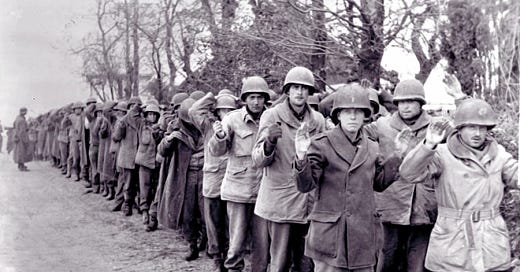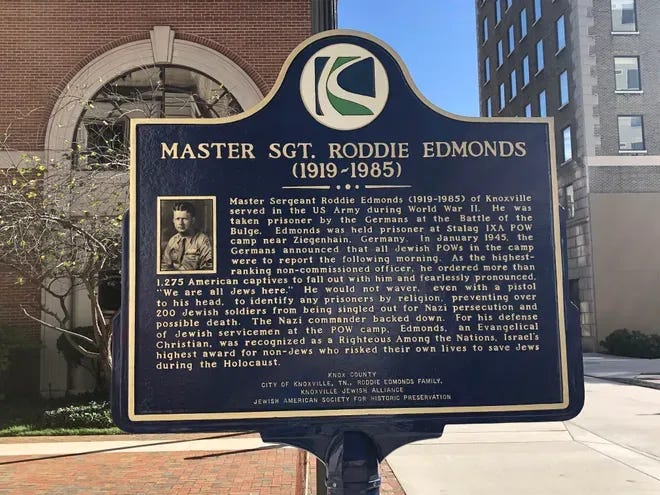This essay was originally published as Roddie Edmonds’s Big Love at the Foundation for Economic Education.
Since I wrote the essay in 2016, Edmonds’s son Chris published his gripping story of Edmonds’s heroism, No Surrender.
We tend to deceive ourselves that we are powerless. Today, like most days we will get the chance to strengthen our “big love” mindset.
Imagine these terrible circumstances. It is 1945. Roddie Edmonds, a 26-year old U.S. Army Master Sergeant, is being held in a German prisoner of war camp. As the highest-ranking soldier among the 1292 American POWs in the camp, he is responsible for their well-being.
Edmonds had been in the camp for one month when the German commandant ordered all Jewish American soldiers to line up outside the barracks the next morning. What happened next?
Roddie Edmonds told his men: “We are not doing that, we are all falling out."
At the lineup, an angry commandant approached Edmonds and exclaimed, “They cannot all be Jews.” Again Edmonds is ordered to identify the Jewish soldiers; there were 200 Jewish soldiers among the soldiers lining up that morning.
The German commandant told Edmonds to identify his Jewish soldiers. Edmonds replied, "We are all Jews here."
Enraged, the commandant pressed a Luger to Edmonds’ head and again demanded that the Jewish soldiers be identified.
His own life on the line, Edmonds had the presence of mind to reply, “According to the Geneva Convention, we only have to give our name, rank, and serial number. If you shoot me, you will have to shoot all of us, and after the war you will be tried for war crimes.”
The commandment lowered his pistol and walked away. Months later Edmonds and his men were liberated.
We would like to think we would have reacted the way Roddie Edmonds did – clearly and decisively. Perhaps. Or perhaps, more likely, our decision-making would have been muddled with thoughts such as, They’re just asking the Jews to fall out for a census purpose. I’m sure the Germans wouldn’t dare harm an American soldier. I would love to save my Jewish soldiers, but I can’t risk the lives of my other men.
Who would have faulted Edmonds if when faced with a gun to his head he simply reasoned, I had no choice but to give in?
Many of us would have failed this extreme test. We would have perceived the situation as one of conflicting interests, saving Jews or surviving. Our thinking may have gone into overdrive, processing our next move. With a muddled mind, the clarity needed to meet the demands of the moment would have been absent.
Big Love
Roddie’s son is Pastor Chris Edmonds. He shares the power of Edmonds’ leadership example:
When Dad got the orders and told his men that they were not giving up the Jewish soldiers, they could have said no. When the commandant pressed the gun against my father, some of the men could have pointed out the Jews. None of them did that. They all stood together.
Chris Edmonds adds that his father’s story “is a clarion call to love one another regardless of our choices or faith. He stood against oppression. He stood for decency. He stood for humanity. This thing we call life – it’s about all of us, not one of us.”
“Love one another.” “All of us.” Idealistic words, but what do they mean in practice? We are used to thinking of love as a personal relationship with another person. Yet, often that “love” seems dependent upon what the other person does for us.
In his book Students of Liberty, FEE founder Leonard Read writes, “The alternative to violence is love.” He continues:
Love, as here used, refers to the application of the kindly virtues in human relations such as tolerance, charity, good sportsmanship, the right of another to his views, integrity, the practice of not doing to others what you would not have them do to you, and other attributes which result in mutual trust, voluntary cooperation, and justice.
Edmonds cared about the well-being of another group of people without thought of his own well-being. Edmonds expressed a bigger love than personal love. We can call this Big Love.
Cultivating Big Love
Stoic philosopher and Roman Emperor Marcus Aurelius advised in his book Meditations:
Meditate often on the interconnectedness and mutual interdependence of all things in the universe. For in a sense, all things are mutually woven together and therefore have an affinity for each other – for one thing follows another according to their tension of movement, their sympathetic stirrings, and the unity of all substance.
It is, of course, difficult for our human senses to imagine “all things” being “mutually woven together.” In a letter to a father struggling to cope with the death of his son, Einstein too saw past the separation that we experience through our senses:
A human being is part of a whole, called by us “Universe,” a part limited in time and space. He experiences himself, his thoughts and his feelings as something separated from the rest, a kind of optical delusion of his consciousness. This delusion is a kind of prison for us. Our task must be to free ourselves from this prison …
We only experience Big Love when we look past the illusion of separation. That day in 1945, Edmonds’ decision-making was not clouded by thoughts of separation or a choice of one or another. Was the commandant bluffing, or did the authority of Love somehow alter the commandant’s decision to act out the violence he threatened?
In Students of Liberty, Read argued that we all see ourselves as loving; we believe others subvert the principle of Love:
It is not necessary to make the case for the principle of love. Most persons will contend that it is the principle we ought to practice, but that it is impractical. But try to find the individual who believes it impractical so far as he is concerned. He doesn’t exist. Each person thinks only that it is others who are incapable of decency.
Is it really only others who are subverting love? Small opportunities to practice Big Love arise all around us.
Consider this everyday event: we are in a supermarket express checkout line with our 15 items. We begin to feel irritated seeing the person in front of us has more than 15 items. We may glare boorishly at the shopper; we might even share some of our self-righteous thoughts. No, we would not be committing violence, and our position may even be “correct.” But would we be contributing to a world where we see that “all things are mutually woven together?” Perhaps the shopper has an urgent need or was merely inattentive.
Self-righteousness is a bitter tonic. We may find that our momentary satisfaction in being “right” at the checkout line has negatively colored our day. Make no mistake, it is our thoughts and actions that cast a shadow on our day, not the actions of the other shopper.
When we get our items to our car, we may decide to not bring our cart to the shopping cart corral. Thoughts of justification may arise as we think the cart corral is too far away. After we drive off we may not give a second thought to the impact of our decision on others. Saving thirty seconds is more important to us than the possibility of damaging another person’s car if our cart rolls away.
Is not our mental irritation, our disregard for the property of others, proof that we believe in the separation that Aurelius and Einstein warned against? Do we really think we can express irritation at others and not feel a tension in our own bodies? What we do to another we may be literally doing to ourselves. Being “mutually woven together” may be more true than we can imagine.
We blame the world for not yielding up the perfect set of circumstances. We comfort ourselves that the “shopper” and “cart corrals” are at fault, not our weakness of character. We tell ourselves that people like Roddie Edmonds are special and that the range of human choices open to us is different for us than for them.
People like Edmonds will seem rare until more of us honor our mutual interdependence as we encounter the small things in life. When faced with a big challenge our self-serving behavior may kick in because our muscles to practice Big Love are flabby.
If our Big Love muscles are flabby, judging ourselves is not called for. Self-condemnation slows, not hastens, learning. Aurelius and Einstein offered a better way to change: make a practice of seeing the “interdependence of all things.”





Wonderful essay. Great example of a standard that we should all try to set for ourselves, but finding ourselves so often falling short. To paraphrase, “There is no love greater than for one man to lay down his own life for the sake of his brother.” Thank you for sharing this insightful and meaningful perspective.
Too often people think the future written, but it is in our hands, and our weapon must be love.